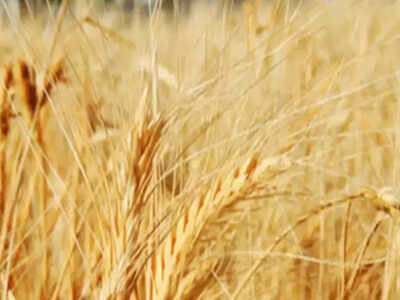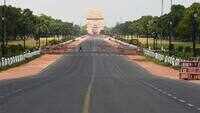
CHANDIGARH: The Haryana government has decided to stop wheat procurement from June 6. Initially, the state had decided to procure the crop from May 20 to June 30. However, the state authorities decided against wheat procurement after June 6 after observing the poor response of farmers in mandis. The political leaders and ministers in the state had earlier announced that there will be no deadline for procurement this year and the process would continue till the last grain in the state is procured.
The state food, civil supplies and consumer affairs department has sent a communication to the chief administrator, Haryana State Agriculture Marketing Board (HSAMB), asking him to convey the message to all secretaries of market committees in Haryana regarding stopping of wheat procurement from June 6. According to the instructions, only those farmers who have registered on the government portal would get a chance to bring their crop in the mandis till June 6.
Government officials say the inflow of wheat in mandis has come down and only around 10-15 thousand metric tonne (MT) wheat every day is being received in mandis in the past one week. Earlier, more than one lakh metric tonne wheat used to be procured every day in the state.
Meanwhile, sources have confirmed that the state has procured around 75 lakh MT wheat till now as against the 93 lakh MT previous year. Similarly, around 8 lakh MT mustard has also been procured as against around 6.9 lakh MT in 2019. Haryana is one of the largest producers of mustard and wheat in the country.
On account of the lockdown due to Covid-19 pandemic, the state government had delayed/staggered the procurement of rabi crops this year. The procurement of mustard was started on April 15 and wheat from April 20.
When asked about the poor wheat procurement this season, one of the senior most bureaucrats of the state said that earlier farmers from neighbouring states used to come and sell their crops in Haryana but this time due to restrictions on account of lockdown, they could not enter the state.
Another reason of comparatively low procurement is that several large farmers or those who have storage capacity have stocked their crop, he added. Because of staggered procurement, the farmers had to take their crop to their residences for storage instead of taking it directly from fields to procurement centres.
The state food, civil supplies and consumer affairs department has sent a communication to the chief administrator, Haryana State Agriculture Marketing Board (HSAMB), asking him to convey the message to all secretaries of market committees in Haryana regarding stopping of wheat procurement from June 6. According to the instructions, only those farmers who have registered on the government portal would get a chance to bring their crop in the mandis till June 6.
Government officials say the inflow of wheat in mandis has come down and only around 10-15 thousand metric tonne (MT) wheat every day is being received in mandis in the past one week. Earlier, more than one lakh metric tonne wheat used to be procured every day in the state.
Meanwhile, sources have confirmed that the state has procured around 75 lakh MT wheat till now as against the 93 lakh MT previous year. Similarly, around 8 lakh MT mustard has also been procured as against around 6.9 lakh MT in 2019. Haryana is one of the largest producers of mustard and wheat in the country.
On account of the lockdown due to Covid-19 pandemic, the state government had delayed/staggered the procurement of rabi crops this year. The procurement of mustard was started on April 15 and wheat from April 20.
When asked about the poor wheat procurement this season, one of the senior most bureaucrats of the state said that earlier farmers from neighbouring states used to come and sell their crops in Haryana but this time due to restrictions on account of lockdown, they could not enter the state.
Another reason of comparatively low procurement is that several large farmers or those who have storage capacity have stocked their crop, he added. Because of staggered procurement, the farmers had to take their crop to their residences for storage instead of taking it directly from fields to procurement centres.

Coronavirus outbreak
Trending Topics
LATEST VIDEOS
City
 Kerala pregnant elephant killing: Preliminary post-mortem reports out
Kerala pregnant elephant killing: Preliminary post-mortem reports out  Bigger tremors round the corner in Delhi-NCR?
Bigger tremors round the corner in Delhi-NCR?  2,550 foreign Tablighi Jamaat members blacklisted by Home Ministry; entry into India banned for 10 years
2,550 foreign Tablighi Jamaat members blacklisted by Home Ministry; entry into India banned for 10 years  Justice will prevail: Kerala CM Pinarayi Vijayan on killing of pregnant elephant
Justice will prevail: Kerala CM Pinarayi Vijayan on killing of pregnant elephant
More from TOI
Navbharat Times
Featured Today in Travel
Quick Links
Kerala Coronavirus Helpline NumberHaryana Coronavirus Helpline NumberUP Coronavirus Helpline NumberBareilly NewsBhopal NewsCoronavirus in DelhiCoronavirus in HyderabadCoronavirus in IndiaCoronavirus symptomsCoronavirusRajasthan Coronavirus Helpline NumberAditya ThackerayShiv SenaFire in MumbaiAP Coronavirus Helpline NumberArvind KejriwalJammu Kashmir Coronavirus Helpline NumberSrinagar encounter
Get the app





